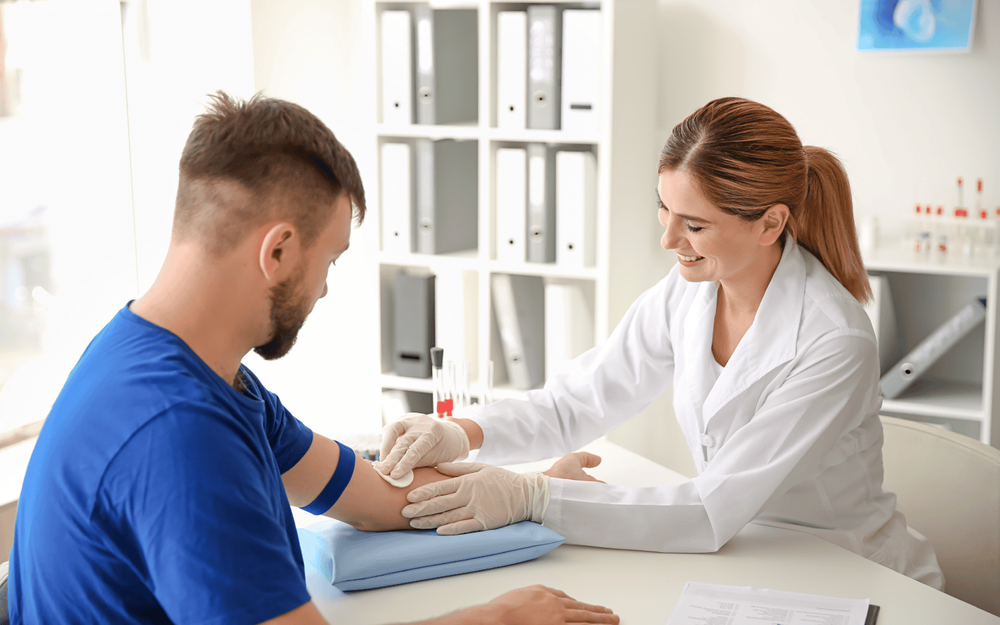
Does Alcohol Lower Testosterone?
Testosterone is often associated with male health, but it plays a vital role in both men and women. From muscle strength to mood and energy levels, balanced testosterone is essential to feeling your best. However, many lifestyle factors can influence your hormone levels, especially alcohol.
So what's the link between alcohol and testosterone? And does drinking really lower your levels? In this article, we explore the facts, the symptoms of low testosterone and what you can do to support healthy hormone balance.
What does testosterone do?
Testosterone is a sex hormone that supports a wide range of important functions in the body. It's key for developing secondary sexual characteristics such as facial hair, a deeper voice and increased muscle mass during puberty, but it also plays a role throughout adulthood.
In both men and women, testosterone helps with:
- Maintaining bone density and muscle mass
- Regulating sex drive and mood
- Producing red blood cells
- Supporting fertility and sperm production
- Distributing fat in the body
Because testosterone affects so many systems even a slight hormonal imbalance can cause noticeable symptoms.
Alcohol and testosterone
Many people are surprised to learn about the effect of alcohol on testosterone. While the occasional drink is unlikely to cause harm, excessive or regular drinking has been shown to lower testosterone levels, particularly in men.
Alcohol can interfere with the glands and hormones that regulate testosterone production, including the hypothalamus and pituitary gland. It may also damage the Leydig cells in the testes, which are responsible for making testosterone.
Over time, drinking too much alcohol may contribute to testosterone low symptoms and negatively impact your health, mood and energy.
Does drinking alcohol lower testosterone?
In short, yes, drinking alcohol can lower testosterone levels. The more you drink, and the more often, the more likely it is to have an effect. Heavy or chronic alcohol use can significantly reduce testosterone in men, while in women, it may cause hormonal fluctuations and disrupt the menstrual cycle.
Even a single episode of binge drinking has been shown to cause a temporary dip in testosterone levels.
If you already have low testosterone, alcohol may make symptoms worse or interfere with any treatments you’re following, such as testosterone replacement therapy.
Symptoms of low testosterone
When your testosterone levels drop, it can affect both your physical and mental wellbeing. Symptoms can vary depending on your age, sex and overall health, but may include:
-
Low sex drive
-
Fatigue or low energy
-
Mood changes or irritability
-
Weight gain or muscle loss
-
Brain fog or difficulty concentrating
-
Reduced strength or stamina
-
Thinning body or facial hair
-
Fertility issues (especially in men)
If you notice any of these signs, it’s worth exploring further. A testosterone blood test can provide a clearer picture of your hormone health.
How to boost testosterone
There are many natural ways to boost testosterone and support overall hormonal balance. Making small lifestyle changes can often have a big impact, especially if your testosterone levels are only slightly low.
Here are some of the most effective steps to take:
Cut back on alcohol Reducing your alcohol intake is one of the first and most important changes you can make. Aim to stay within recommended weekly guidelines and avoid binge drinking wherever possible.
Get regular exercise Physical activity, especially resistance training and weightlifting, can significantly raise testosterone levels. Exercise also helps with weight management, which is closely linked to hormone health, as excess body fat can increase the conversion of testosterone to oestrogen.
Eat a testosterone-friendly diet Nutrition plays a vital role in hormone production. Focus on whole foods, including lean protein, healthy fats (like those found in oily fish, avocados and nuts) and plenty of leafy greens and colourful vegetables. Certain micronutrients, like zinc and magnesium, are particularly important for testosterone health.
Prioritise good sleep Your body produces the majority of its testosterone during sleep, particularly in the early morning hours. Poor or interrupted sleep can lower your levels and increase stress hormones like cortisol. Try to get 7–9 hours of quality sleep each night, and follow a consistent bedtime routine to help regulate your body’s natural rhythms.
Manage your stress levels Chronic stress causes an increase in cortisol, which can negatively affect testosterone. Finding healthy ways to manage stress - such as mindfulness, yoga, deep breathing or spending time in nature - can support better hormonal balance and improve your overall wellbeing.
Consider key supplements If you’re deficient in certain nutrients like vitamin D, zinc or magnesium, your testosterone levels may be affected. Supplementing these (under the guidance of a health professional) may help support healthy hormone function. Your GP or a blood test can help confirm any deficiencies.
In some cases, your doctor may recommend medical options like testosterone replacement therapy (TRT), particularly if your levels are clinically low and symptoms are impacting your quality of life. TRT involves supplementing testosterone through injections, gels or patches to restore balance.
Private health checks for peace of mind
If you’re concerned about your testosterone levels or wondering if alcohol is affecting your hormones, a private testosterone blood test can offer reassurance and clarity.
At Bluecrest Wellness, we offer male and female hormone tests that can be added to a wider health assessment. These tests measure key hormone markers and can help identify any imbalances, giving you the confidence to take the next steps for your wellbeing.
Our full-body health MOTs also include checks for blood pressure, cholesterol and more - providing a complete overview of your health in one convenient appointment.
With over 350 clinics across the UK and Ireland, it’s easy to book a test close to home. You’ll receive a personalised results report and ongoing GP support for 12 months.













